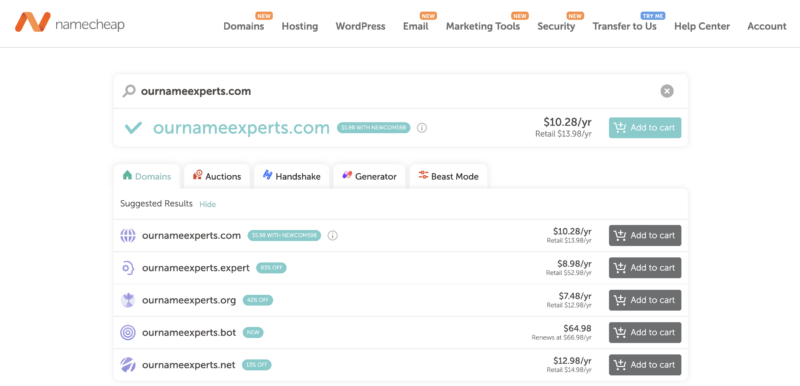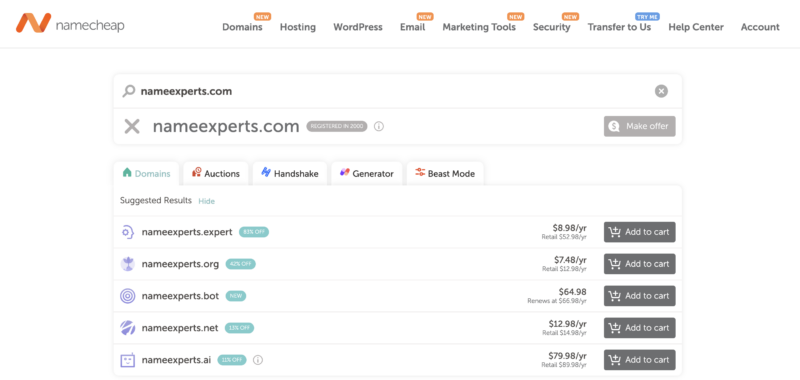A domain name is your website’s unique identifier. It is the address people type into their browser when they want to visit your website. For example, typing “nameexperts.com” in your browser leads to this very website.
Most businesses with an online presence need a domain name, but business owners often don’t know how to get one. You’ve arrived at the right place if you fall into this category. We’ll explain how to buy and register a domain name for your business.
Before Buying Your Domain
Let’s examine the essential steps to take before buying a domain name:
Choose a domain name
A domain is a unique web address, meaning two websites can’t use the same domain name. The first step to buying a domain is to choose the right domain name for your business.
The domain should be brandable and easy to remember. It’s how customers will find you, so avoid any name that gives people headaches when recalling. The domain should preferably include the name of your business so that people can easily guess it if they are not sure what it is. Let’s say you run an electronics store named MJ Gadgets; the perfect domain name is MJGadgets.com. If this domain isn’t available, you can look for alternatives like ShopMJGadgets.com, BuyMJGadgets.com, and MJGadgets.net.
Choose a premium domain name if you can afford it, as they are short, catchy, and memorable domain names that draw valuable organic traffic. Most successful online businesses use premium domain names.
Choose an Extension
The extension is what comes after the dot (.) in your domain name. “.COM” is the most popular domain extension and should be your first choice. If “.COM” isn’t available, you can pick alternative extensions like “.NET,” “.ORG,” and “.CO.”
Google and other search engines have confirmed that your choice of extension doesn’t impact rankings. However, it significantly affects consumer perception. People generally don’t trust uncommon domain extensions like “.XYZ,” “.BLOG,” “.WEBSITE,” etc.
Understand How Domains are Valued
Before making a final decision, you should understand how domain names are valued, especially if you plan to sell the domain later. Many factors contribute to a domain’s value, including:
- Length: The shorter a domain’s length, the easier it is to remember and the more valuable it becomes.
- TLD: Some domain extensions are more valuable than others, such as “.COM” “.NET,“ .AI,” “.IO,” etc. The more popular the domain extension, the more valuable it is.
- Length of domain history: The longer a domain name has existed on the web, the more likely it is to command a high value.
- Keyword popularity: Domains with generic keywords people frequently search for tend to have high value, e.g., “Amazon.com,” “Stripe.com,” “Square.com,” etc.
Verify if it is available
Considering the above factors, it’s time to check if your desired domain name is available. You can do this by simply going to any domain registrar and typing the desired name in the search box. If the domain is available, the registrar will offer to sell it to you. Otherwise, the registrar will notify you that someone else has already registered the domain.
To demonstrate, let’s search for a random domain, “ournameexperts.com” on Namecheap, a popular domain registrar. Namecheap said this domain name is available, and we could register it immediately.

Now let’s search for “nameexperts.com.” Namecheap said this domain name has been registered by someone else since 2000. Of course, that’s the domain you’re currently on, so you can’t register it for yourself.

If your desired domain name is available, move to the next section on how to buy a domain name outright. If it has been taken, move to the ensuing section on how to buy a domain name that is already registered.
How to Buy a Domain Name
1. Choose a domain registrar
Any domain name must come from an accredited registrar, such as Namecheap, Dynadot, Hover, Bluehost, and Domain.com. Over 2,400 domain registrars are accredited by ICANN, the governing body of the global domain registration system, so finding a suitable one shouldn’t be an issue. You can see the full list of all ICANN-accredited registrars here. Any supposed registrar not on this list is illegitimate.
2. Select your domain and extension
The next step is making a final choice about the domain and extension for your online business. We’ve discussed the factors that should influence your decision, but it’s worth reiterating that “.COM” is the best extension. This is the first extension most people consider when looking for a brand’s website. If a random person wants to guess your website name, they’ll likely type the name followed by a .COM and hope their browser will show your website.
The .COM extension is easily recognizable and helps your website rank higher on search engines. Domain names with this extension also command a higher resale value, giving it a competitive edge over other domain extensions.
3. Select How Long to Register the Domain
Domain name ownership isn’t etched in stone. Every domain has an expiry date, although you can renew the registration for as long as you want. You can register a new domain for up to 10 years, with each additional year carrying higher upfront costs. The bright side is that you don’t need to bother about short-term price changes once you’ve registered a domain for many years.
If you want to build a valuable long-term brand, 5 to 10 years is the optimal period to register a new domain. But if you can’t afford a long-term registration, you can register it for a year and turn on auto-renew so that the registrar automatically renews it when due.
You can’t technically buy a domain forever, but you can use some workarounds to own it for a seemingly infinite time.
4. Purchase your Domain
Enter the available domain name into your registrar’s search box and click the buy button. On the checkout page, most registrars suggest adding domain privacy to the registration package. Some registrars offer domain privacy for free, while others demand extra fees for this perk.
Do you need domain privacy?
Domain privacy protection means hiding your personal information from the public WHOIS database. This ICANN-operated database contains information on all domain owners and is open to anyone. However, you might be uncomfortable with your contact information being out in the open. In that case, you can request domain privacy for your registrar to hide your personal details from the WHOIS database.
If you have no issues with your contact information being publicly searchable in the WHOIS database, you can ignore your registrar’s domain privacy suggestion.
5. Complete the Registration Process
Pay for the domain name with a credit or debit card and complete the registration process. Your registrar will ask for contact information, including a name and email address, to register the domain. This information is usually listed in the WHOIS database, but domain privacy lets you hide it.
6. Verify domain registration
Your registrar will send a verification email confirming ownership of the domain you purchased. Click on the link in the verification email and smile because you have formally joined the club of domain name owners.
How to Buy a Domain that is Already Registered
We can predict your disappointment if you find out that your desired domain has already been registered. However, don’t fret—there’s still a way out. You can contact the owner and formally offer to acquire their domain, especially if it isn’t connected to an active website.
Finding a domain owner and making a reasonable acquisition offer can be exhausting, so seeking a domain broker’s services is advisable. Domain brokers are experts who specialize in buying and selling domain names– the internet’s equivalent of a real estate agent. If you’re interested in a house not publicly offered for sale, you’ll likely seek a real estate agent. Similarly, if you want a domain that is already registered, seek a domain broker to handle the negotiations.
Domain brokers can help you find the owner of a domain even if their information isn’t available on the WHOIS database. Then, they’ll reach out to the owner for negotiations. This part is critical because domain brokers have proper knowledge and experience in domain name valuation. If you’re negotiating directly, you might underbid a domain and cause the owner to ignore you or overbid for a domain and get played on. A domain broker sets a reasonable bid on your behalf and adjusts when necessary.
If the owner agrees to sell their domain name, the broker handles the escrow and ensures you aren’t cheated. Then, they’ll transfer the domain name to you. Name Experts is a reliable domain broker that helps you purchase valuable domain names. We offer our clients stellar services for reasonable fees. For more information on domain brokerage services, you can see our in-depth guide on how to buy a domain from someone else.
Sometimes, the broker helps you find the owner who says they don’t want to sell for any reason. In that case, it’s wise to avoid beating a dead horse and seek a new domain name, preferably something similar to your first choice. It can be as simple as choosing another extension with the same prefix, e.g., OurNameExperts.com > OurNameExperts.net.
What to Do After Buying Your Domain
You’ve acquired a domain, so what’s next? A lot can happen next. The obvious choice is to connect your domain to a website and work on attracting traffic. You’ll need a web hosting plan from a reliable company. The company hosts your website on its servers so that people can access it anytime, and you’ll pay a fee for this perk. The good news is that web hosting has become as affordable as ever– you can find hosting packages for as low as $5 monthly.
The type of website you want determines your hosting provider. For example, if you run an online store, you’ll need an e-commerce hosting service like Shopify, Shift4Shop, Squarespace, and WooCommerce for WordPress. If it’s a news site, social platform, booking website, or anything else, you can find endless hosting options for it.
You can also create a professional email address attached to your domain name. Professional email addresses make your business look brilliant and increase the chances of getting a response when you pitch to clients. You can trademark your domain, market the website, and even sell it later. There are endless things to do after buying a domain name.



